A central claim in support of the nuclear deal with Iran has been that the heavy sanctions that have been placed on Iran will, under the terms of the deal, “snap back” in the event of Iranian violations. The White House has been explicit on this point, declaring on multiple occasions that “if at any time Iran fails to fulfill its commitments, these sanctions will snap back into place.”
But does the text of the deal actually support this claim? Contrary to claims of the administration, the agreement reached at Vienna (known as the Joint Comprehensive Plan of Action or JCPOA) does not include any agreed-upon reimposition of sanctions in the event that Iran fails to meet its commitments. Although such a mechanism is described in the one section of the text, additional sentences indicate that the entire concept is actually not accepted by the Iranians—and to the contrary, any reimposition of sanctions would be viewed by the Iranians as a material breach of the agreement and grounds for its cancellation. So Iran, at that point hundreds of billions richer and able to withstand external pressures it cannot today, would see itself able to engage in whatever nuclear activity it wants without any restriction.
The relevant clauses appear twice: Once in section 26, at the very end of the discussion of the US commitment to refrain from re-imposing lifted sanctions or introducing new ones, and then again in section 37, at the very end of the discussion of how Iranian violations will be addressed by the UN. In section 26 it appears as follows:
Iran has stated that it will treat such a re-introduction or re-imposition of the sanctions specified in Annex II, or such an imposition of new nuclear-related sanctions, as grounds to cease performing its commitments under this JCPOA in whole or in part.
Later, in section 37, after describing how the UN could reimpose sanctions in the event of Iranian non-compliance, we discover the following:
Iran has stated that if sanctions are reinstated in whole or in part, Iran will treat that as grounds to cease performing its commitments under this JCPOA in whole or in part.
The appearance of these clauses in the text raises the following question: If one side states that if the other exercises a described redress in the event of noncompliance, they will see that as “grounds for” pulling out of the deal entirely, isn’t that tantamount to saying they view the reimposition of sanctions as a material breach—and that, in other words, they do not accept, in principle, any reimposition of sanctions under any circumstances?
The suspicion that this is the case, and that the U.S. may even have willingly conceded this point, grows further with a careful reading of the sentences in section 26 that lead up to the clause quoted above. There we learn that the U.S. has made the following explicit commitment:
The U.S. Administration, acting consistent with the respective roles of the President and the Congress, will refrain from re-introducing or re-imposing the sanctions specified in Annex II that it has ceased applying under this JCPOA, without prejudice to the dispute resolution process provided for under this JCPOA.
After committing to lifting U.S. sanctions, section 26 makes no mention of the possibility of the U.S. re-imposing sanctions at all. Neither does the rest of the document include any such mention. In other words, it would appear the U.S. has agreed under the JCPOA to refrain from re-imposing sanctions even if the Iranians are found to have violated their commitments, so long as such violation is not sufficiently bad to require tearing up the whole agreement. This is noticeably different from section 37, in which it is clear that the P5+1 view the reimposition of UN sanctions as a possible outcome of the dispute resolution process—although there, too, it is made clear that the Iranians would view such reimposition as a material breach and grounds for pulling out of the deal.
Put simply: any reimposition of U.S. sanctions would appear to constitute a basic breach of the agreement, and this has been agreed to by both sides. Reimposition of UN sanctions, on the other hand, is only a violation of the agreement in the eyes of the Iranians—yet it is still not a possibility that can legitimately be seen as part of anything that can be called “the agreement.”
Thus, there is no “snap-back” provision in the agreement whatsoever. We may have been sold the JCPOA as an agreement, but in fact with regard to the whole discussion of reimposing sanctions—one of the most crucial selling points of the deal from the administration’s perspective—the document may be more accurately described as the record of a disagreement.
Photo: Wikimedia




